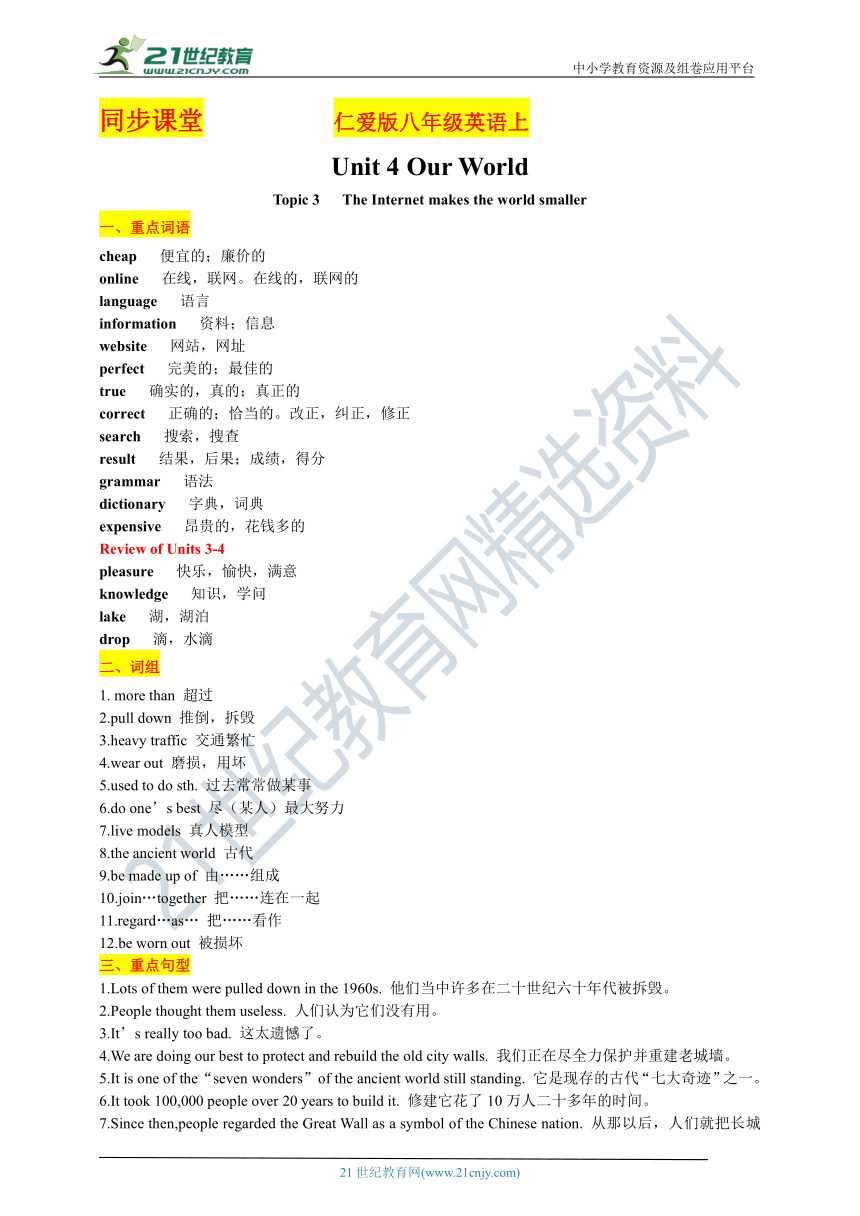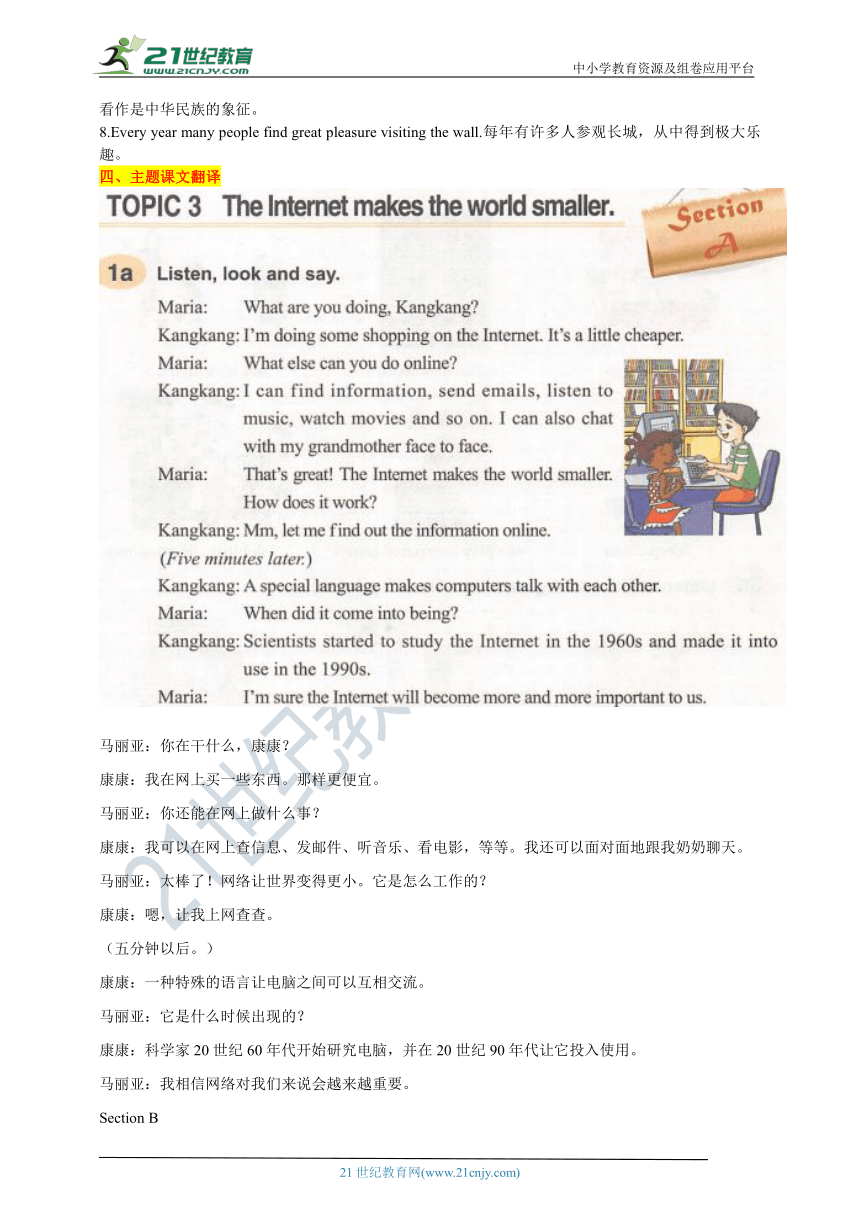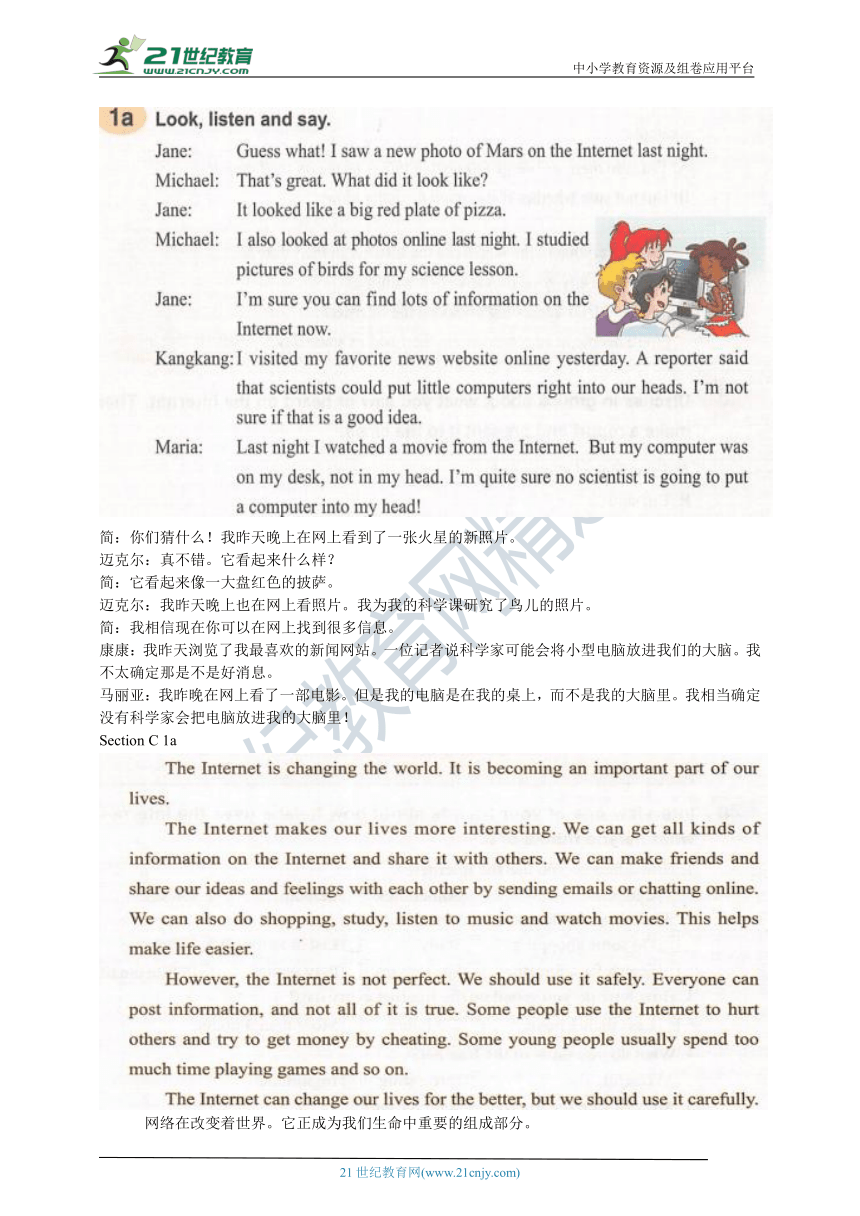U4 Topic 3 The Internet makes the world smaller同步课堂
文档属性
| 名称 | U4 Topic 3 The Internet makes the world smaller同步课堂 |

|
|
| 格式 | doc | ||
| 文件大小 | 1.0MB | ||
| 资源类型 | 试卷 | ||
| 版本资源 | 仁爱科普版 | ||
| 科目 | 英语 | ||
| 更新时间 | 2021-08-04 09:16:28 | ||
图片预览



文档简介
中小学教育资源及组卷应用平台
同步课堂 仁爱版八年级英语上
Unit 4 Our World
Topic 3 The Internet makes the world smaller
一、重点词语
cheap 便宜的;廉价的
online 在线,联网。在线的,联网的
language 语言
information 资料;信息
website 网站,网址
perfect 完美的;最佳的
true 确实的,真的;真正的
correct 正确的;恰当的。改正,纠正,修正
search 搜索,搜查
result 结果,后果;成绩,得分
grammar 语法
dictionary 字典,词典
expensive 昂贵的,花钱多的
Review of Units 3-4
pleasure 快乐,愉快,满意
knowledge 知识,学问
lake 湖,湖泊
drop 滴,水滴
二、词组
1. more than 超过
2.pull down 推倒,拆毁
3.heavy traffic 交通繁忙
4.wear out 磨损,用坏
5.used to do sth. 过去常常做某事
6.do one’s best 尽(某人)最大努力
7.live models 真人模型
8.the ancient world 古代
9.be made up of 由……组成
10.join…together 把……连在一起
11.regard…as… 把……看作
12.be worn out 被损坏
三、重点句型
1.Lots of them were pulled down in the 1960s. 他们当中许多在二十世纪六十年代被拆毁。
2.People thought them useless. 人们认为它们没有用。
3.It’s really too bad. 这太遗憾了。
4.We are doing our best to protect and rebuild the old city walls. 我们正在尽全力保护并重建老城墙。
5.It is one of the“seven wonders”of the ancient world still standing. 它是现存的古代“七大奇迹”之一。
6.It took 100,000 people over 20 years to build it. 修建它花了10万人二十多年的时间。
7.Since then,people regarded the Great Wall as a symbol of the Chinese nation. 从那以后,人们就把长城看作是中华民族的象征。
8.Every year many people find great pleasure visiting the wall.每年有许多人参观长城,从中得到极大乐趣。
四、主题课文翻译
马丽亚:你在干什么,康康?
康康:我在网上买一些东西。那样更便宜。
马丽亚:你还能在网上做什么事?
康康:我可以在网上查信息、发邮件、听音乐、看电影,等等。我还可以面对面地跟我奶奶聊天。
马丽亚:太棒了!网络让世界变得更小。它是怎么工作的?
康康:嗯,让我上网查查。
(五分钟以后。)
康康:一种特殊的语言让电脑之间可以互相交流。
马丽亚:它是什么时候出现的?
康康:科学家20世纪60年代开始研究电脑,并在20世纪90年代让它投入使用。
马丽亚:我相信网络对我们来说会越来越重要。
Section B
简:你们猜什么!我昨天晚上在网上看到了一张火星的新照片。
迈克尔:真不错。它看起来什么样?
简:它看起来像一大盘红色的披萨。
迈克尔:我昨天晚上也在网上看照片。我为我的科学课研究了鸟儿的照片。
简:我相信现在你可以在网上找到很多信息。
康康:我昨天浏览了我最喜欢的新闻网站。一位记者说科学家可能会将小型电脑放进我们的大脑。我不太确定那是不是好消息。
马丽亚:我昨晚在网上看了一部电影。但是我的电脑是在我的桌上,而不是我的大脑里。我相当确定没有科学家会把电脑放进我的大脑里!
Section C 1a
网络在改变着世界。它正成为我们生命中重要的组成部分。
网络让我们的生活更有趣。我们可以在网上找到各种各样的信息,并且与他人分享。我们可以交朋友,并且通过发邮件或在网上聊天互相分享想法和感受。我们还可以购物、学习、听音乐和看电影。这会让生活更容易些。
但是,网络并不是完美的。我们应该安全上网。每个人都可以发表信息,但不是所有信息都是真实的。有些人利用网络伤害别人,并且试图通过欺骗获得钱财。一些年轻人通常花太多时间在网上玩游戏等等。
网络能让我们的生活变得更好,但是我们应该谨慎上网。
五、重点语言点
Section A
1. There used to be lots of old city walls in Beijing.
There used to be 某地曾经有某物
2. Most old city walls were pulled down in the 1960s, because they were worn out.
短语:①pull down 拆毁 ②be worn out 不能再用了,被穿破了:My shoes are worn out.
③ wear out 穿破 Children _wear_ _out_ their shoes very quickly.
Section B
1. The first emperor, Qin Shihuang, ordered his men to make them.
order sb. to do sth. 命令某人去做某事
2. The builders used live models, didn’t they ?
live / laiv / adj. ①活的,主要指动物,live fish. ②(电视)直播的
3. It stands in New York.(it指自由女神像)
stand ①站;②耸立;③忍受 (后接名词或动词ing)
Section C
1. The building is made up of two million stones.
be made up of 由…组成 The football team is made up of eleven players.
2. Each stone weighs more than two tons.
(1) weigh(动词)重,它的对应名词为weight (重量),形容词为 heavy, 如:
① Cao Chong weighed the elephant. ② lose weight 减肥
(2) long (形容词)长的;length (名词) 长度
(3) high (形容词)高的;height / hait /(名词) 高度
3. The first emperor, Qin Shihuang, joined the old walls together.
join… together 把…连接起来:join the pieces of paper together.
Section D
初中英语18种特殊的反意疑问句
1. 当陈述部分含有以下这些含有否定意义的词时:few, little, seldom,hardly, never, not, no, no one, nobody, nothing, none, neither等,其反意疑问句需用肯定结构。例如:
He is never late for school, is he? 他上学从不迟到,是吗?
2. 祈使句。祈使句后一般加上will you或won't you构成反意疑问句,用will you 多表示“请求”,用won't you 多表示提醒对方注意。例如:Look at the blackboard, will you/ won't you? Let引导的祈使句有两种情况:
(1)Let's...,后的反意疑问句用 shall we例如:Let's go home, shall we ? 回家吧,好吗?
(2)Let us/me...后的反意疑问句用will you例如:Let me have a try, will you ?
3. 陈述部分的主语是everything, nothing, anything或something 时,反意疑问句的主语应用代词it。例如:Something is wrong with my radio, isn't it? 我的收音机出毛病了,是吧?
4. 陈述部分的主语是 everybody, everyone, anybody, anyone, somebody, someone, nobody,
no one, none, neither 时, 其反意疑问句的主语需用复数代词they。例如:
Everyone is here, aren't they? 大家都到了,是吗?
No one knows about it, do they? 没有人知道这件事,对吗?
5. 感叹句。感叹句后加反意疑问句时,其反意疑问句需用be的一般现在时态的否定形式。例如:What fine weather, isn't it? 多好的天气啊,是吧?
6. 陈述部分主、谓语是I am...时,反意疑问句用aren't I, 例如:I'm working now, aren’t I?
7. 当陈述部分所含的形容词是通过加前缀或后缀构成的,不能视为否定词。例如:
①It is unfair, isn't it? ② She is unhappy, isn’t she ?
8. 当陈述部分主语是从句、不定式(短语)、动词-ing形式时,反意疑问句的主语应该用it。例如:What you need is more important, isn't it?你需要的东西更重要,是吧?
9. 当陈述部分含I think (believe, suppose...)that... 结构时,其反意疑问句须与从句的主、谓语保持一致,例如:I don't think he will come, will he? 我认为他不会来,对吗?
10. 陈述部分有have to 时,其反意疑问句要用助动词的否定形式。例如:
You have to water the vegetables every day, don't you?你每天都要浇菜,对吧?
11. 陈述部分有had better时,反意疑问句中要用hadn't。例如:
We had better go to school at once, hadn't we? 我们现在最好马上去上学,好吗?
12. 当陈述部分含有情态动词must时,我们便要分析一下must的含义。如果must 作“必须”讲,反意疑问句须用needn't;而当must作推测意义“一定是;必定”讲时,反意疑问句则需根据must后的动词原形选用相应的形式。例如:
He must work hard at physics, needn’t he? 他必须努力学物理,是吧?
Tom must be at home,isn't he? 汤姆一定在家,是吧?
六、语法学习
语法学习
反意疑问句:由陈述句(或祈使句、感叹句)加一个简短问句构成的疑问句叫反意疑问
句。实质是前面陈述句的反问句。
一般对应规律:前肯后否;前否后肯。即陈述部分为肯定形式,附加问句用否定形式;陈述部分为否定形式,附加问句用肯定形式。如:
There are many pyramids in Egypt,aren’t there?在埃及有许多金字塔,不是吗?
Sally visited the Great Wall last month,didn’t she?萨莉上个月参观了长城,不是吗?
He doesn’t realize the importance of saving water,does he?他没有意识到节约用水的重要性,是吗?
特例点拨:①I’m your good friend,aren’t I?我是你的好朋友,不是吗?I don’t think you can rebuild the house,can you?我认为你不能重修这座房子,是吗?(I don’t think…主要在说think后的内容,故按从句变化)。
②陈述部分有nobody,nothing,never,no,few(没几个),little(几乎没有),hardly(几乎不)等否定或半否定词时,仍视为否定句。根据反意疑问句对应规律,疑问部分用肯定形式。如:There is nothing in the room,is there?屋子里什么也没有,是吗?
Maria never surports me,does she? 玛丽亚从未支持过我,是吗?
He had few apples,did he? 他几乎没有苹果,是吗?
③祈使句的反意疑问句:无论肯定或否定,通常在祈使句后加上will you?如:
Please close the door,will you?请关门好吗?
Don’t tear down the old walls,will you?不要拆毁古墙,好吗?
但以Let’s开头的祈使句用shall we?如:
let’s make a survey,shall we?我们做个调查,好吗?
_21?????????è?????(www.21cnjy.com)_
同步课堂 仁爱版八年级英语上
Unit 4 Our World
Topic 3 The Internet makes the world smaller
一、重点词语
cheap 便宜的;廉价的
online 在线,联网。在线的,联网的
language 语言
information 资料;信息
website 网站,网址
perfect 完美的;最佳的
true 确实的,真的;真正的
correct 正确的;恰当的。改正,纠正,修正
search 搜索,搜查
result 结果,后果;成绩,得分
grammar 语法
dictionary 字典,词典
expensive 昂贵的,花钱多的
Review of Units 3-4
pleasure 快乐,愉快,满意
knowledge 知识,学问
lake 湖,湖泊
drop 滴,水滴
二、词组
1. more than 超过
2.pull down 推倒,拆毁
3.heavy traffic 交通繁忙
4.wear out 磨损,用坏
5.used to do sth. 过去常常做某事
6.do one’s best 尽(某人)最大努力
7.live models 真人模型
8.the ancient world 古代
9.be made up of 由……组成
10.join…together 把……连在一起
11.regard…as… 把……看作
12.be worn out 被损坏
三、重点句型
1.Lots of them were pulled down in the 1960s. 他们当中许多在二十世纪六十年代被拆毁。
2.People thought them useless. 人们认为它们没有用。
3.It’s really too bad. 这太遗憾了。
4.We are doing our best to protect and rebuild the old city walls. 我们正在尽全力保护并重建老城墙。
5.It is one of the“seven wonders”of the ancient world still standing. 它是现存的古代“七大奇迹”之一。
6.It took 100,000 people over 20 years to build it. 修建它花了10万人二十多年的时间。
7.Since then,people regarded the Great Wall as a symbol of the Chinese nation. 从那以后,人们就把长城看作是中华民族的象征。
8.Every year many people find great pleasure visiting the wall.每年有许多人参观长城,从中得到极大乐趣。
四、主题课文翻译
马丽亚:你在干什么,康康?
康康:我在网上买一些东西。那样更便宜。
马丽亚:你还能在网上做什么事?
康康:我可以在网上查信息、发邮件、听音乐、看电影,等等。我还可以面对面地跟我奶奶聊天。
马丽亚:太棒了!网络让世界变得更小。它是怎么工作的?
康康:嗯,让我上网查查。
(五分钟以后。)
康康:一种特殊的语言让电脑之间可以互相交流。
马丽亚:它是什么时候出现的?
康康:科学家20世纪60年代开始研究电脑,并在20世纪90年代让它投入使用。
马丽亚:我相信网络对我们来说会越来越重要。
Section B
简:你们猜什么!我昨天晚上在网上看到了一张火星的新照片。
迈克尔:真不错。它看起来什么样?
简:它看起来像一大盘红色的披萨。
迈克尔:我昨天晚上也在网上看照片。我为我的科学课研究了鸟儿的照片。
简:我相信现在你可以在网上找到很多信息。
康康:我昨天浏览了我最喜欢的新闻网站。一位记者说科学家可能会将小型电脑放进我们的大脑。我不太确定那是不是好消息。
马丽亚:我昨晚在网上看了一部电影。但是我的电脑是在我的桌上,而不是我的大脑里。我相当确定没有科学家会把电脑放进我的大脑里!
Section C 1a
网络在改变着世界。它正成为我们生命中重要的组成部分。
网络让我们的生活更有趣。我们可以在网上找到各种各样的信息,并且与他人分享。我们可以交朋友,并且通过发邮件或在网上聊天互相分享想法和感受。我们还可以购物、学习、听音乐和看电影。这会让生活更容易些。
但是,网络并不是完美的。我们应该安全上网。每个人都可以发表信息,但不是所有信息都是真实的。有些人利用网络伤害别人,并且试图通过欺骗获得钱财。一些年轻人通常花太多时间在网上玩游戏等等。
网络能让我们的生活变得更好,但是我们应该谨慎上网。
五、重点语言点
Section A
1. There used to be lots of old city walls in Beijing.
There used to be 某地曾经有某物
2. Most old city walls were pulled down in the 1960s, because they were worn out.
短语:①pull down 拆毁 ②be worn out 不能再用了,被穿破了:My shoes are worn out.
③ wear out 穿破 Children _wear_ _out_ their shoes very quickly.
Section B
1. The first emperor, Qin Shihuang, ordered his men to make them.
order sb. to do sth. 命令某人去做某事
2. The builders used live models, didn’t they ?
live / laiv / adj. ①活的,主要指动物,live fish. ②(电视)直播的
3. It stands in New York.(it指自由女神像)
stand ①站;②耸立;③忍受 (后接名词或动词ing)
Section C
1. The building is made up of two million stones.
be made up of 由…组成 The football team is made up of eleven players.
2. Each stone weighs more than two tons.
(1) weigh(动词)重,它的对应名词为weight (重量),形容词为 heavy, 如:
① Cao Chong weighed the elephant. ② lose weight 减肥
(2) long (形容词)长的;length (名词) 长度
(3) high (形容词)高的;height / hait /(名词) 高度
3. The first emperor, Qin Shihuang, joined the old walls together.
join… together 把…连接起来:join the pieces of paper together.
Section D
初中英语18种特殊的反意疑问句
1. 当陈述部分含有以下这些含有否定意义的词时:few, little, seldom,hardly, never, not, no, no one, nobody, nothing, none, neither等,其反意疑问句需用肯定结构。例如:
He is never late for school, is he? 他上学从不迟到,是吗?
2. 祈使句。祈使句后一般加上will you或won't you构成反意疑问句,用will you 多表示“请求”,用won't you 多表示提醒对方注意。例如:Look at the blackboard, will you/ won't you? Let引导的祈使句有两种情况:
(1)Let's...,后的反意疑问句用 shall we例如:Let's go home, shall we ? 回家吧,好吗?
(2)Let us/me...后的反意疑问句用will you例如:Let me have a try, will you ?
3. 陈述部分的主语是everything, nothing, anything或something 时,反意疑问句的主语应用代词it。例如:Something is wrong with my radio, isn't it? 我的收音机出毛病了,是吧?
4. 陈述部分的主语是 everybody, everyone, anybody, anyone, somebody, someone, nobody,
no one, none, neither 时, 其反意疑问句的主语需用复数代词they。例如:
Everyone is here, aren't they? 大家都到了,是吗?
No one knows about it, do they? 没有人知道这件事,对吗?
5. 感叹句。感叹句后加反意疑问句时,其反意疑问句需用be的一般现在时态的否定形式。例如:What fine weather, isn't it? 多好的天气啊,是吧?
6. 陈述部分主、谓语是I am...时,反意疑问句用aren't I, 例如:I'm working now, aren’t I?
7. 当陈述部分所含的形容词是通过加前缀或后缀构成的,不能视为否定词。例如:
①It is unfair, isn't it? ② She is unhappy, isn’t she ?
8. 当陈述部分主语是从句、不定式(短语)、动词-ing形式时,反意疑问句的主语应该用it。例如:What you need is more important, isn't it?你需要的东西更重要,是吧?
9. 当陈述部分含I think (believe, suppose...)that... 结构时,其反意疑问句须与从句的主、谓语保持一致,例如:I don't think he will come, will he? 我认为他不会来,对吗?
10. 陈述部分有have to 时,其反意疑问句要用助动词的否定形式。例如:
You have to water the vegetables every day, don't you?你每天都要浇菜,对吧?
11. 陈述部分有had better时,反意疑问句中要用hadn't。例如:
We had better go to school at once, hadn't we? 我们现在最好马上去上学,好吗?
12. 当陈述部分含有情态动词must时,我们便要分析一下must的含义。如果must 作“必须”讲,反意疑问句须用needn't;而当must作推测意义“一定是;必定”讲时,反意疑问句则需根据must后的动词原形选用相应的形式。例如:
He must work hard at physics, needn’t he? 他必须努力学物理,是吧?
Tom must be at home,isn't he? 汤姆一定在家,是吧?
六、语法学习
语法学习
反意疑问句:由陈述句(或祈使句、感叹句)加一个简短问句构成的疑问句叫反意疑问
句。实质是前面陈述句的反问句。
一般对应规律:前肯后否;前否后肯。即陈述部分为肯定形式,附加问句用否定形式;陈述部分为否定形式,附加问句用肯定形式。如:
There are many pyramids in Egypt,aren’t there?在埃及有许多金字塔,不是吗?
Sally visited the Great Wall last month,didn’t she?萨莉上个月参观了长城,不是吗?
He doesn’t realize the importance of saving water,does he?他没有意识到节约用水的重要性,是吗?
特例点拨:①I’m your good friend,aren’t I?我是你的好朋友,不是吗?I don’t think you can rebuild the house,can you?我认为你不能重修这座房子,是吗?(I don’t think…主要在说think后的内容,故按从句变化)。
②陈述部分有nobody,nothing,never,no,few(没几个),little(几乎没有),hardly(几乎不)等否定或半否定词时,仍视为否定句。根据反意疑问句对应规律,疑问部分用肯定形式。如:There is nothing in the room,is there?屋子里什么也没有,是吗?
Maria never surports me,does she? 玛丽亚从未支持过我,是吗?
He had few apples,did he? 他几乎没有苹果,是吗?
③祈使句的反意疑问句:无论肯定或否定,通常在祈使句后加上will you?如:
Please close the door,will you?请关门好吗?
Don’t tear down the old walls,will you?不要拆毁古墙,好吗?
但以Let’s开头的祈使句用shall we?如:
let’s make a survey,shall we?我们做个调查,好吗?
_21?????????è?????(www.21cnjy.com)_
同课章节目录
- Unit 1 Playing Sports
- Topic 1 I'm going to play basketball.
- Topic 2 I'll kick you the ball again.
- Topic 3 The school sports meet is coming.
- Unit 2 Keeping Healthy
- Topic 1 You should brush your teeth twice a day.
- Topic 2 I must ask him to give up smoking.
- Topic 3 Must we exercise to prevent the flu?
- Unit 3 Our Hobbies
- Topic 1 What's your hobby?
- Topic 2 What sweet music!
- Topic 3 What were you doing at this time yesterday
- Unit 4 Our World
- Topic 1 What's the strongest animal on the farm?
- Topic 2 How can we protect ourselves from the eart
- Topic 3 The Internet makes the world smaller.
